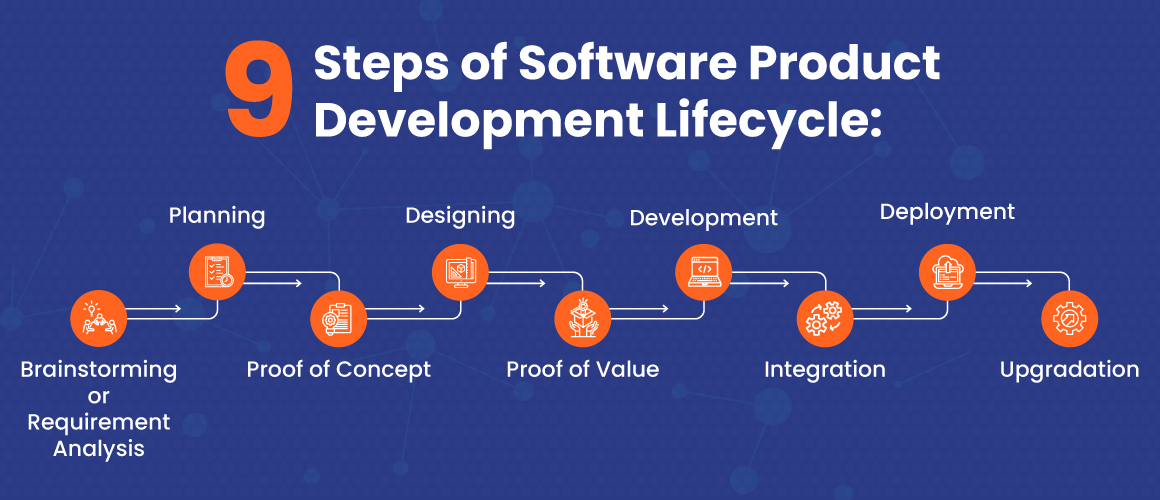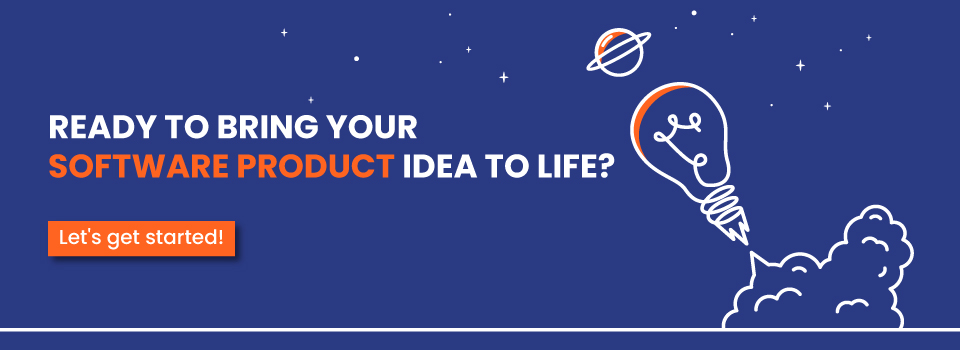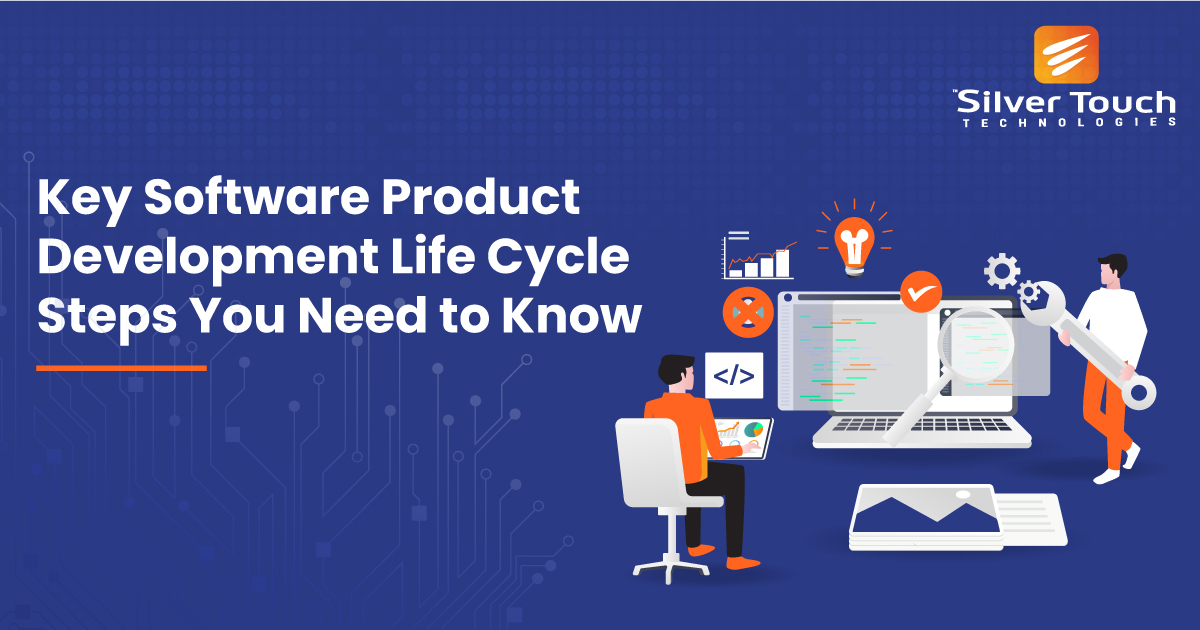Evolving technology has put forth newer ways of software product development. Many software developers have embraced these ways to ensure that the end product can meet user requirements and business objectives. Be it development or testing, advanced software product development methods enable developers to make changes in the product rapidly.
In this post, we will delve into the steps and methodologies of software product development lifecycle. However, it is necessary to understand this concept before seeing its importance in modern enterprises.
Understanding of Software Product Development Life Cycle
Software product development is about creating a new product with some new features to enhance its value. A software product can be anything ranging from building a new product from scratch or upgrading the existing one. The software development company aims to give users a better experience and bring change in market trends.
The software product development lifecycle is a chain of various methodical and steady processes that has several phases or standard procedures. Dedicated software developers can integrate a set of features and third-party tools during the software product development life cycle. It can upgrade the existing systems and methods to enhance the customer experience.
Let’s go through the importance of the software product development life cycle.
Importance of Software Product Development Life Cycle
Simply put, the software development life cycle (SDLC) is a structured process that helps developers deliver high-quality products on time and cost-effectively. The lifecycle includes a series of phases, each with specific goals and deliverables. This helps to ensure well-planned execution of the project with a proactive approach in resolving issues or removing bugs.
We can mention many benefits of following the SDLC, including:
- Meets the needs of target users
- Reduces risk of project failure
- Enhances collaboration between team members
- Ensures timely development within budget
- Improves quality and customer satisfaction
If you're planning to develop a software product, it is better to consult a reputed software development company to know the role of SDLC in achieving your goals.
Let’s dig deep into the steps included in the product development life cycle.
Nine Software Product Development Life Cycle Steps
Software developers need to follow a specific methodology and several predefined steps to transform the client’s idea into a unique solution.

Here we mention the common steps of a software development cycle.
1. Brainstorming or Requirement Analysis
Here entrepreneurs come up with the initial concept for their software product. Software developers need to define your objectives, make a list of features, and brainstorm how you can make your product stand out.
2. Planning
Developers conduct a feasibility study to determine the technical and financial viability of the project. Companies need to create a product roadmap and identify potential risks as well in their blueprint.
3. Proof of Concept
PoC or Proof of Concept is a small-scale prototype of the software product that the software development company can use to validate the client’s idea and identify any potential problems in it.
4. Designing
Here, a team consisting of software designers and developers can create detailed software architecture and design documents. This step includes the creation of prototypes and final mockups of the product.
5. Proof of Value
PoV or Proof of Value is a more in-depth analysis of the value of a particular software product to the company. Here, it is necessary to identify the target market, estimate potential revenue, and assess the competition.
6. Development
It is a crucial step where software developers will write the code for a product. They'll need to ensure that the code is clean, efficient, and compliant with the client’s business requirements and other aspects.
7. Integration
The QA team in the software development company will test the software to ensure its seamless performance. The team performs a variety of tests including functionality, user acceptance, and system integration testing.
8. Deployment
Usually, this is known as the final stage in the software product development life cycle. Many development companies include the release and maintenance of software on an ongoing basis as per the project needs.
9. Upgradation
Many enterprises opt for regular improvement of the software product based on changing requirements and market trends. This stage includes the addition of new features, performance improvements, and bug fixing.
A specific methodology is necessary while following all these steps in software product development. Let’s dig deep into these four popular methodologies.
You May Also Like: Enterprise Software Development- Trends, Challenges, and Opportunities
Four Popular Software Product Development Methodologies
We take only four popular methodologies for the product development life cycle out of many options available.
Waterfall
It is a sequential approach to software development. It requires completing each step in the process before the next step can begin. The Waterfall model is best suited for projects where the requirements are well-defined and the scope of the project is relatively small. It consists of different consecutive steps including conception, initiation, analysis, design, development, testing, implementation, and maintenance.
Agile
This methodology is an iterative approach to software development. As per this approach, the project is broken down into small, manageable chunks, and software developers process and test each chunk in a short sprint. This allows for the project to be more adaptable to change, and the software development company can complete the project more quickly than the same with the waterfall model.
DevOps
As one of the most popular methods, DevOps is a combination of development and operations. It aims to shorten the software product development life cycle and improve quality by bringing together developers, operations engineers, and other stakeholders. DevOps teams work together to automate the software development process and to ensure that software is deployed and released quickly and reliably.
Scrum
This is a specific type of agile methodology. As a lightweight, pragmatic framework, Scrum helps development teams to deliver software quickly and efficiently. Its design enables developers to adapt rapidly to ever-changing circumstances and user demands with ease. Scrum teams are self-organizing and cross-functional, and they work in short sprints to deliver seamlessly-performing software.
Choosing the right methodology for your software development project is essential for successful development and deployment.

Conclusion
In a nutshell, the software development life cycle has various steps and different methodologies depending on the project requirements, budget, deadlines, and market trends. Here we have shed light on all essential factors necessary to consider for entrepreneurs and software developers alike. You can use this concise guide to choose the right method to avoid product failure.
Silver Touch Technologies is a leading enterprise software development company. Our in-house teams of experienced professionals can thoroughly understand your business model and project requirements to suggest you the most suitable software development methodology. Simply email us at info@silvertouch.com to know more about our enterprise-grade services.
FAQs
What is the software product development life cycle?
The software product development life cycle refers to a series of methodical processes and phases involved in creating or upgrading a software product.
Why is the software product development life cycle important?
The software development life cycle (SDLC) ensures high-quality, timely, and cost-effective product delivery, meeting user needs, reducing project failure risk, enhancing collaboration, and improving customer satisfaction.
What are the common steps in the software product development life cycle?
The common steps in the software product development life cycle include brainstorming/requirement analysis, planning, proof of concept, designing, proof of value, development, integration, deployment, and upgradation.
What are some popular software product development methodologies?
Popular software product development methodologies include Waterfall, Agile, DevOps, and Scrum, each with its own approach to development, adaptability, and collaboration.
How do I choose the right methodology for software development?
Choosing the right methodology depends on factors such as project requirements, budget, deadlines, and market trends. Consulting with a reputable software development company can help you determine the most suitable methodology for your project.



